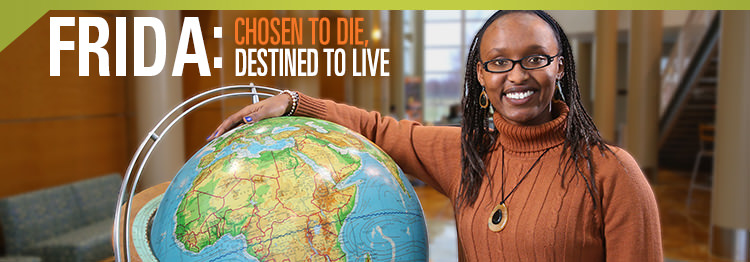Frida: Chosen to die, destined to live
Student Brings Story of Survival and Inspiration to BGSU

To many who walk the halls at BGSU Firelands, Frida Gashumba looks like any other student; but her horn-rimmed glasses and compelling dark eyes mask the face of someone who has endured great tragedy and lived to share her experiences.
Gashumba was born in 1980 in Rwanda, Africa. She ran and played and was considered one of the more gifted children in her rural farming village. Owning a banana plantation, the Gashumba family was financially stable and highly respected pillars of the community who were always open-hearted and generous. Her childhood was happy and she lived without fear.
It was not until the age of 14 that Frida's life was tragically and irrevocably changed.
In 1994 Rwanda was stricken with one of history's most horrific cultural clashes - a genocide which claimed the lives of an estimated 800,000 people in just 100 days. It was the culmination of a struggle between the Hutu and Tutsi tribes which has ebbed and flowed in Rwanda for decades.
Frida and her family were Tutsi. "Tutsi were the minority tribe in Rwanda," said Frida, "People were brainwashed to believe Tutsi were less than human. We were made to feel like snakes and cockroaches to be exterminated."
It was on May 7, 1994 that a band of Hutu men came for Frida and her family. "We heard their songs before we saw them. It was a disgusting sight. They were vying with each other to see who was the fiercest killer," said Gashumba.
The Hutu lined Frida, her family members and the other villagers next to a ditch and debated about the best way to kill a Tutsi. Frida and her young siblings listened as the killers talked of using machetes, clubs, bullets or even a grenade. Eventually the Hutu decided a Tutsi was not worth the price of a bullet so a club would be used.
The villagers were told to crawl into the ditch and the Hutu jumped in to club the Tutsi to death. The slayers were indiscriminate in their killing - men, women and children all perished. Frida received a blow to the back of the head and was left for dead among her slain family members. Together they were all buried in the ditch.
"If God gives you another chance, you have to make the best of it and try to do good for others"Later that day, miraculously, a family friend dragged Frida from the ditch. She was alive, but filled with a tremendous sense of loss and aloneness. "My father was dead. My mother was dead. My brothers and sisters were dead," she said. "I felt like I had nothing to live for."
Despair could have easily overwhelmed Frida, but she chose a different path. "If God gives you another chance, you have to make the best of it and try to do good for others," said Frida. She vowed to "get better, not bitter."
With support from a church and family in Huron County, Frida was able to move to the United States. She is now a student at BGSU Firelands studying nursing. Her goal is to earn her degree and then use her skills to help others - especially those in Rwanda where she has already done philanthropic work with orphans.
Frida has also published a book on her experience and uses it as a tool during presentations to students and community members. "Frida: Chosen to Die, Destined to Live," tells her dramatic story of life amid the horrors of the Rwanda genocide. More importantly, she shares how her life has been utterly transformed by the power to forgive and love her enemies.
Frida's message is one of immense hope and personal deliverance pointing toward the transforming power of forgiveness.
"There is still a lot of healing which I need to do," said Frida, but her life is much different now. "I love being a BGSU Firelands student and all of the friendly and kind people who are making life better for me."
Updated: 12/02/2017 12:54AM
